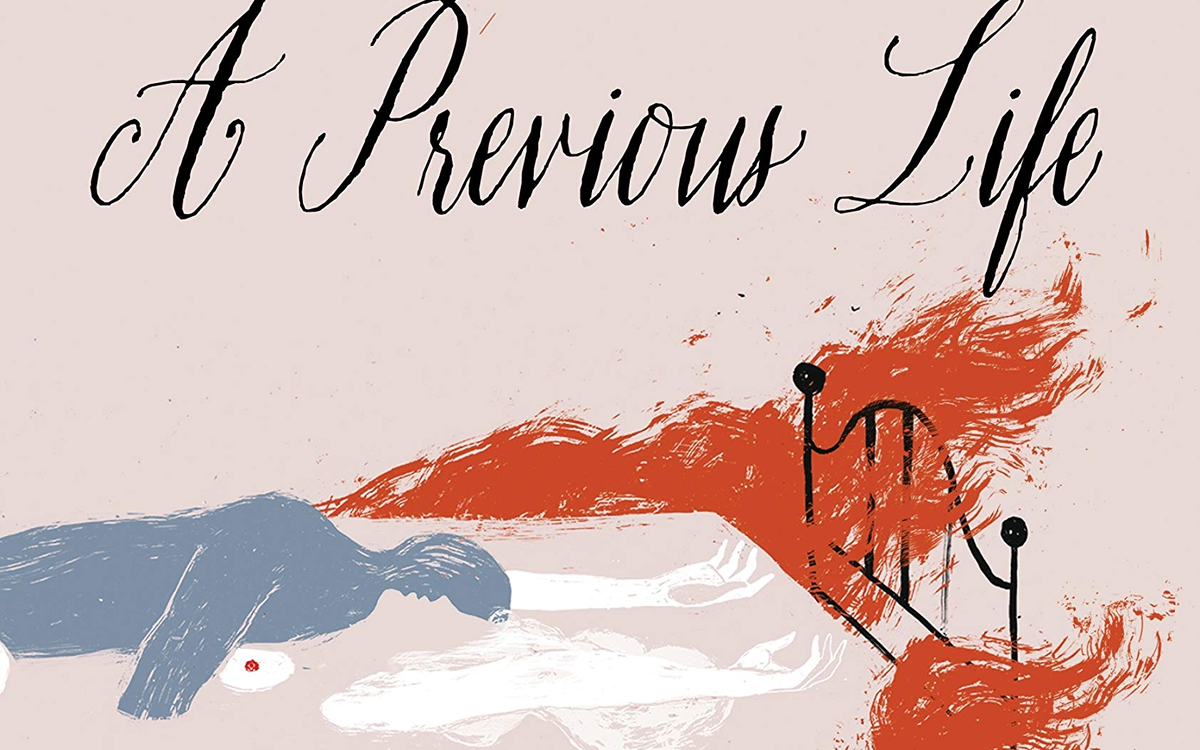Books
Edmund White’s latest a cornucopia of desire, adventure, wit
‘A Previous Life’ offers meta take on polyamory, bisexuality

‘A Previous Life: Another Posthumous Novel’
By Edmund White
c.2022, Bloomsbury Publishing
$26/270 pages
If you’re jonesing for sex, polyamory, and gossipy confessions, don’t rush toward the bright young things.
You’ll find as much, likely more, lust, beauty, and love – spiced with fab gab, if you turn to Edmund White, the queer, 82-year-old, acclaimed novelist, essayist, biographer and memoirist.
In “A Previous Life,” his latest novel, White gives us enough passion to rouse even the stoniest heart. The novel, a work of metafiction set in 2050, features a polyamorous, bisexual married couple – Ruggero Castelnuovo, a 70-year-old, Sicilian, renowned harpsichordist, and Constance, 30, a wannabe American writer. One day, after he breaks his leg skiing, Ruggero is stuck in the chalet where he and Constance live. Constance cares for him as he recovers.
Ruggero and Constance have had quite a past. They have agreed not to talk to each other about their past sexual adventures and affairs. Too much honesty can only cause trouble, they believe. They agreed “soon after they met never to talk about their past lives;” White writes, “transparency had destroyed their earlier marriages.”
But, as Ruggero convalesces, the couple changes their views. They decide that transparency would be good, and agree to write and read to each other their “confessions” about their past – from one-night hook-ups to short, hot romances to long-term liaisons.
“A Previous Life” is a glorious, galloping romp through their sexual adventures. Gender fluidity and bisexuality are the norm for them. And for many others in their time (three decades from now – at mid 21st century).
Ruggero, whose parents died young, was raised in Sicily by his grandfather. Early on, he knew that he liked music and boys. He begins having sex as a teen with his hetero cousin Giuseppe. He adored showering with Giuseppe and gazing at Giuseppe’s butt. His cousin’s ass, Ruggero tells Constance, was “soccer round, luminously white, the cracks beckoning and furry and unsuspecting.”
Ruggero grows up to be a critically acclaimed musician and a bisexual, adventurous lover. Among Ruggero’s many affairs, was his romance with the deceased, perhaps passe, but historically important writer Edmund White. Before wedding Constance, Ruggero was married twice.
Constance, whose parents also die when she is a child, is raised by family friends in Bowling Green, Ohio. Her first experience with sex – when her “uncle,” her legal guardian, sexually abuses her – is traumatic. She gets herself away from this situation by getting a scholarship to Princeton. After college, she lives through two terrible marriages. One husband robs her of all the money she’s earned. Another husband, a pompous, closet-case writer, humiliates her. Like Ruggero, Constance has had male and female lovers.
White, a co-founder of the Gay Men’s Health Crisis and of the 1980s queer writers group The Violet Quill, grew up in the Midwest in the 1940s and 1950s when you weren’t out if you were gay and knew no openly queer people.
When White began to write in the 1960s and 1970s, he was one of the first queer writers to write novels with gay protagonists — let alone queer characters who didn’t die or go to prison for their queerness. In that homophobic time, White was one of a very few queer authors who were brave enough to come out in their work.
White is best-known for his autobiographical fiction – especially, for his semi-autobiographical trilogy: “A Boy’s Own Story” (1982), “The Beautiful Room is Empty” (1988) and “The Farewell Symphony” (1997).
White is the main character of “A Previous Life.” Yet, the novel is meta. In it, White, the author, seems to grapple with his legacy. Because it’s set 30 years in the future, White’s able to imagine, from a distance of three decades, what his place in literary history will be. He wonders if the only people who will remember his work are a few “old queens.” There’s a biography out about his life but “scholars have worked more on [David] Sedaris.”
There’s little likelihood of White’s legacy ever being diminished. His work is too important to LGBTQ and literary history to be erased.
“A Previous Life” is a cornucopia of desire, adventure and wit.
Books
Embracing the chaos can be part of the fun
‘Make Sure You Die Screaming’ offers many twists and turns

‘Make Sure You Die Screaming’
By Zee Carlstrom
c.2025, Random House
$28/304 pages
Sometimes, you just want to shut the door and forget what’s on the other side.
You could just wipe it from your memory, like it didn’t occur. Or create an alternate universe where bad things never happen to you and where, as in the new novel “Make Sure You Die Screaming” by Zee Carlstrom, you can pretend not to care.

Their mother called them “Holden,” but they’d stopped using that name and they hadn’t decided what to use now. What do you call an alcoholic, queer, pessimistic former ad executive who’s also “The World’s First Honest White Man,” although they no longer identify as a man? It’s a conundrum that they’ll have to figure out soon because a cop’s been following them almost since they left Chicago with Yivi, their psychic new best friend.
Until yesterday, they’d been sleeping on a futon in some lady’s basement, drinking whatever Yivi mixed, and trying not to think about Jenny. They killed Jenny, they’re sure of it. And that’s one reason why it’s prudent to freak out about the cop.
The other reason is that the car they’re driving was stolen from their ex-boyfriend who probably doesn’t know it’s gone yet.
This road trip wasn’t exactly well-planned. Their mother called, saying they were needed in Arkansas to find their father, who’d gone missing so, against their better judgment, they packed as much alcohol as Yivi could find and headed south. Their dad had always been unique, a cruel man, abusive, intractable; he suffered from PTSD, and probably another half-dozen acronyms, the doctors were never sure. They didn’t want to find him, but their mother called…
It was probably for the best; Yivi claimed that a drug dealer was chasing her, and leaving Chicago seemed like a good thing.
They wanted a drink more than anything. Except maybe not more than they wanted to escape thoughts of their old life, of Jenny and her death. And the more miles that passed, the closer they came to the end of the road.
If you think there’s a real possibility that “Make Sure You Die Screaming” might run off the rails a time or three, you’re right. It’s really out there, but not always in a bad way. Reading it, in fact, is like squatting down in a wet, stinky alley just after the trash collector has come: it’s filthy, dank, and profanity-filled. Then again, it’s also absurd and dark and philosophical, highly enjoyable but also satisfying and a little disturbing; Palahniuk-like but less metaphoric.
That’s a stew that works and author Zee Carlstrom stirs it well, with characters who are sardonic and witty while fighting the feeling that they’re unredeemable losers – which they’re not, and that becomes obvious.
You’ll see that all the way to one of the weirdest endings ever.
Readers who can withstand this book’s utter confusion by remembering that chaos is half the point will enjoy taking the road trip inside “Make Sure You Die Screaming.”
Just buckle up tight. Then shut the door, and read.
The Blade may receive commissions from qualifying purchases made via this post.
Books
Two new books on dining out LGBTQ-style
Visit nightclubs, hamburger joints, and a bathhouse that feeds customers

‘What is Queer Food? How We Served a Revolution’
By John Birdsall
c.2025, W.W. Norton
$29.99/304 pages
‘Dining Out: First Dates, Defiant Nights, and Last Call Disco Fries at America’s Gay Restaurants’
By Erik Piepenburg
c.2025, Grand Central
$30/352 pages
You thought a long time about who sits where.
Compatibility is key for a good dinner party, so place cards were the first consideration; you have at least one left-hander on your guest list, and you figured his comfort into your seating chart. You want the conversation to flow, which is music to your ears. And you did a good job but, as you’ll see with these two great books on dining LGBTQ-style, it’s sometimes not who sits where, but whose recipes were used.
When you first pick up “What is Queer Food?” by John Birdsall, you might miss the subtitle: “How We Served a Revolution.” It’s that second part that’s important.

Starting with a basic gay and lesbian history of America, Birdsall shows how influential and (in)famous 20th century queer folk set aside the cruelty and discrimination they received, in order to live their lives. They couldn’t speak about those things, he says, but they “sat down together” and they ate.
That suggested “a queer common purpose,” says Birdsall. “This is how who we are, dahling, This is how we feed our own. This is how we stay alive.”
Readers who love to cook, bake or entertain, collect cookbooks, or use a fork will want this book. Its stories are nicely served, they’re addicting, and they may send you in search of cookbooks you didn’t know existed.
Sometimes, though, you don’t want to be stuck in the kitchen, you want someone else to bring the grub. “Dining Out” by Erik Piepenburg is an often-nostalgic, lively look at LGBTQ-friendly places to grab a meal – both now and in the past.

In his introduction, Piepenburg admits that he’s a journalist, “not a historian or an academic,” which colors this book, but not negatively. Indeed, his journeys to “gay restaurants” – even his generous and wide-ranging definitions of the term – happily influence how he presents his narrative about eateries and other establishments that have fed protesters, nourished budding romances, and offered audacious inclusion.
Here, there are modern tales of drag lunches and lesbian-friendly automats that offered “cheap food” nearly a century ago. You’ll visit nightclubs, hamburger joints, and a bathhouse that feeds customers on holidays. Stepping back, you’ll read about AIDS activism at gay-friendly establishments, and mostly gay neighborhood watering holes. Go underground at a basement bar; keep tripping and meet proprietors, managers, customers and performers. Then take a peek into the future, as Piepenburg sees it.
The locales profiled in “Dining Out” may surprise you because of where they can be found; some of the hot-spots practically beg for a road trip.
After reading this book, you’ll feel welcome at any of them.
If these books don’t shed enough light on queer food, then head to your favorite bookstore or library and ask for help finding more. The booksellers and librarians there will put cookbooks and history books directly in your hands, and they’ll help you find more on the history and culture of the food you eat. Grab them and you’ll agree, they’re pretty tasty reads.
The Blade may receive commissions from qualifying purchases made via this post.

You’re going to be on your feet a lot this month.
Marching in parades, dancing in the streets, standing up for people in your community. But you’re also likely to have some time to rest and reflect – and with these great new books, to read.
First, dip into a biography with “Marsha: The Joy and Defiance of Marsha P. Johnson” by Tourmaline (Tiny Rep Books, $30), a nice look at an icon who, rumor has it, threw the brick that started a revolution. It’s a lively tale about Marsha P. Johnson, her life, her activism before Stonewall and afterward. Reading this interesting and highly researched history is a great way to spend some time during Pride month.
For the reader who can’t live without music, try “The Dad Rock That Made Me a Woman” by Niko Stratis (University of Texas Press, $27.95), the story of being trans, searching for your place in the world, and finding it in a certain comfortable genre of music. Also look for “The Lonely Veteran’s Guide to Companionship” by Bronson Lemer (University of Wisconsin Press, $19.95), a collection of essays that make up a memoir of this and that, of being queer, basic training, teaching overseas, influential books, and life.
If you still have room for one more memoir, try “Walk Like a Girl” by Prabal Gurung (Viking, $32.00). It’s the story of one queer boy’s childhood in India and Nepal, and the intolerance he experienced as a child, which caused him to dream of New York and the life he imagined there. As you can imagine, dreams and reality collided but nonetheless, Gurung stayed, persevered, and eventually became an award-winning fashion designer, highly sought by fashion icons and lovers of haute couture. This is an inspiring tale that you shouldn’t miss.
No Pride celebration is complete without a history book or two.
In “Trans History: From Ancient Times to the Present Day” by Alex L. Combs & Andrew Eakett ($24.99, Candlewick Press), you’ll see that being trans is something that’s as old as humanity. One nice part about this book: it’s in graphic novel form, so it’s lighter to read but still informative. Lastly, try “So Many Stars: An Oral History of Trans, Nonbinary, Genderqueer, and Two-Spirit People of Color” by Caro De Robertis (Algonquin Books of Chapel Hill. $32.00) a collection of thoughts, observations, and truths from over a dozen people who share their stories. As an “oral history,” you’ll be glad to know that each page is full of mini-segments you can dip into anywhere, read from cover to cover, double-back and read again. It’s that kind of book.
And if these six books aren’t enough, if they don’t quite fit what you crave now, be sure to ask your favorite bookseller or librarian for help. There are literally tens of thousands of books that are perfect for Pride month and beyond. They’ll be able to determine what you’re looking for, and they’ll put it directly in your hands. So stand up. March. And then sit and read.




















